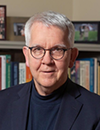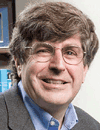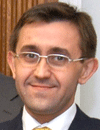Paul BohnArthur J. Schmitt Professor of Chemical and Biomolecular Engineering and Professor of Chemistry and Biochemistry, University of Notre Dame Paul W. Bohn received the B.S. from the University of Notre Dame in 1977 and the Ph.D. from the University of Wisconsin-Madison in 1981, both in Chemistry. After two years at Bell Laboratories, he joined the faculty at the University of Illinois at Urbana-Champaign (UIUC). In 2006, he moved to the University of Notre Dame where he is currently the Arthur J. Schmitt Professor of Chemical and Biomolecular Engineering, Professor of Chemistry and Biochemistry, and Director of the Institute for Precision Health. He served as Editor for the Americas for the RSC journal Analyst 2007-09 and as Chair of the Editorial Board 2010-14. Prof. Bohn is currently co-editor of Annual Review of Analytical Chemistry. His research interests include: (a) integrated nanofluidic and microfluidic chemical measurement strategies for personal monitoring, (b) chemical and biochemical sensing in mass-limited samples, (c) biochemical imaging, and (d) molecular approaches to nanotechnology, areas in which he has over 290 publications and 10 patents. |
Amanda EvansScientist, Los Alamos National Laboratory Dr. Evans received her Ph.D. in organic synthesis from the University of Cambridge (Professor Steven Ley). She was subsequently appointed as a Teaching Fellow and Director of Studies in Chemistry at Murray Edwards College, University of Cambridge. She has been a Fulbright Scholar and a RSC JWT Fellowship recipient, in addition to appointments as a Visiting Professorship at the University of Nice – Sophia Antipolis and as an Assistant Professor in Bio-Organic Chemistry at California State University Fullerton. Dr. Evans currently works at Los Alamos National Laboratory as a Scientist (Physical Organic Chemistry) in the Biosciences Division. She utilizes both batch and continuous processing/bioprocessing approaches for making molecules and her research interests remain diverse, spanning microfluidic syntheses, continuous flow biocatalysis, high energy compounds, DNA nanotechnology, and polymeric materials. She possesses an extensive background in the generation of chiral substrates and the use of synthetic techniques in combination with other cross-disciplinary methods to construct and characterize molecular or macromolecular compounds with useful material and/or biological properties for interdisciplinary applications. She is particularly interested in establishing more innovative, scalable and sustainable enabling methodologies for creating chiral molecules. |
Volker HesselProfessor, School of Chemical Engineering, The University of Adelaide Professor Volker Hessel studied chemistry at Mainz University (PhD in organic chemistry, 1993). In 1994 he entered the Institut für Mikrotechnik Mainz GmbH. In 2002, Prof. Hessel was appointed Vice Director R&D at IMM and in 2007 as Director R&D. In 2005 and 2011, Prof. Hessel was appointed as Part-time and Full Professor at Eindhoven University of Technology, respectively. He was Honorary Professor at TU Darmstadt, Germany and is Guest Professor at Kunming University of Science and Technology, China. Prof. Hessel was appointed as Deputy Dean (Research) and Full Professor at the School of Chemical Engineering in the ECMS Faculty at the University of Adelaide, Australia. He is (co-)author of > 450 peer-reviewed (h-index: 54). He received the AIChE Award “Excellence in Process Development Research” in 2007, the ERC Advanced Grant “Novel Process Windows” in 2010, the ERC Proof of Concept Grant in 2017, the IUPAC ThalesNano Prize in Flow Chemistry in 2016, the FET OPEN Grant in 2016, and the ERC Synergy Grant 2018. He was authority in the 35-man teamed Parliament Enquete Commission "Future of the Chemical Industry" in Nordrhine-Westfalia. |
Klavs JensenProfessor, Massachusetts Institute Of Technology Klavs F. Jensen is Warren K. Lewis Professor and Head of the Chemical Department at the Massachusetts Institute of Technology. His research interests revolve around novel techniques for continuous organic synthesis, flow chemistry. Catalysis, chemical kinetics and transport phenomena related to flow chemistry are also topics of interest along with development of simulation approaches for reactive chemical systems, specifically simulation across multiple length and time scales. He is the recipient of several awards and he is a member of the US National Academy of Engineering and the American Academy of Arts and Science. |
Paul WattsDistinguished Professor and Research Chair, Nelson Mandela University Prof Paul Watts started his career as a lecturer at the University of Hull in 2002, being promoted to full professor in 2011. At the University of Hull he led the micro reactor and flow technology group. In February 2013, he moved to Nelson Mandela University to hold the Distinguished Professorship and Research Chair in Microfluidic Bio/Chemical Processing. He has published of over 120 highly cited papers. He strongly believes that scientists should conduct research that impacts society; the biggest project underway involves the local production of key drugs as the morbidity and mortality from major diseases are much more devastating in Africa than in other regions of the world. The vision is that new technology will be used within South Africa to manufacture generic drugs; this could create jobs and a new manufacturing industry within the country. |




